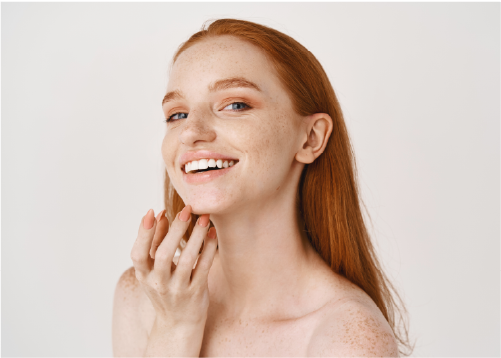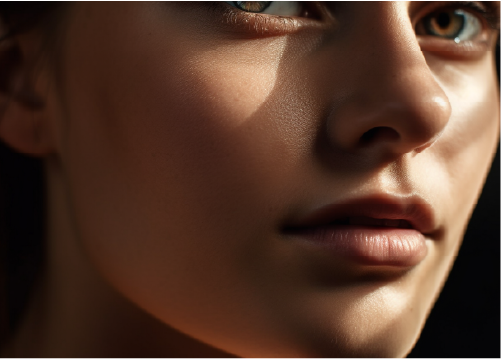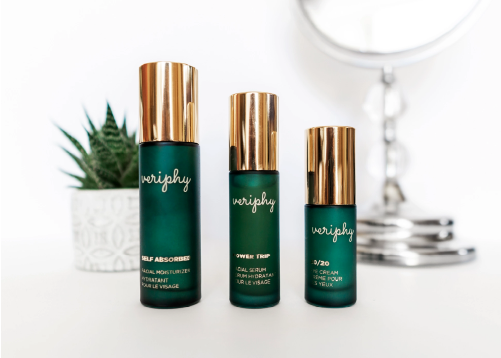
Fresh air and sunshine are important for our health and wellbeing, but when spending time outdoors it’s important to recognize how your skin is affected. UV radiation from the sun is the primary cause of premature skin aging and impacts the skin on many levels. Understanding the risks and knowing what you can do to manage them are essential to maintaining skin health year round.
What is UV Light?
UV radiation is a form of light emitted by the sun. While it is most intense during the summer months, we are exposed to UV light throughout the year. There are two types of UV that interact with our skin: UVA and UVB. The defining characteristic of each is their wavelength, which determines how much energy it carries and how deeply it penetrates.
- UVA – penetrates skin deeper and has less energy
- UVB – only penetrates the skin’s surface and has more energy
How Does UV Light Affect Your Skin?
UVA and UVB affect the skin in different ways. UVB reaches only the surface layers, where it induces an inflammatory response that results in sunburns. UVA can penetrate the skin to the deeper layers, where living tissue can be affected. Because of this, UVA is primarily responsible for premature skin aging. Although both types of UV light contribute to cellular damage in different ways, together their damage can build up over time and lead to visible signs of premature skin aging, skin conditions, and skin cancers.
Thankfully, your skin has some defenses in place to help mitigate these damaging effects. Let’s take a look at two of these mechanisms: pigmentation and antioxidant defenses against oxidative stress.
Pigmentation
The pigment that gives your skin its colour is melanin. Melanin helps to protect our skin from UV damage by absorbing some of the harmful rays before they have a chance to damage our cells. When our skin detects harmful amounts of UV, it promotes the production of melanin, resulting in skin tone darkening, otherwise known as tanning. This is a stress response in the skin as it prepares to take on more damage. When the amount of UV exceeds the capacity for melanin to protect it, skin cells become damaged and trigger the familiar inflammation of a sunburn. Because of this, those with fairer skin tend to burn more easily than those with more pigmented skin.
While melanin can help protect your skin from damage, melanin production can be taken too far. An overproduction of melanin, a process called hyperpigmentation, results in an uneven skin tone and solar lentigo or “sun spots,” which are flat discolorations on the skin that often appear in sun-exposed areas like the face and hands.
Oxidative Stress
Another damaging effect of UV is the generation of free radicals in the skin. These are highly reactive molecules that can cause serious damage to our cells and their DNA, resulting in genetic defects, mutations, and ultimately skin cancer. As well, free radicals can alter the structure of lipids and proteins in the skin, contributing to the premature formation of wrinkles and other visible signs of aging.
Antioxidants in the skin help to neutralize free radicals by reacting with them before they react with something else. However, when our stores of antioxidants are depleted, we can end up with more damage than can be controlled.
What Can You Do to Manage UV Damage?
First and foremost, using a broad spectrum SPF sunscreen is essential to minimizing the damaging effects of UV light. It’s important to note that SPF is an indication of UVB protection only. Look for a “broad spectrum” sunscreen to ensure you’re getting protection from UVA as well. Apply before sun exposure and be sure to reapply every 2 hours.
Avoiding sun exposure when possible will have a big impact as well. When outdoors, seek out shaded areas and bring a hat along.
Choosing skincare products that help combat the effects of UV related skin aging can also be beneficial, though you shouldn’t rely on them to prevent damage. Antioxidants like vitamin C and E help replenish your skin’s natural antioxidant defenses. Anti-inflammatory and soothing ingredients like calendula and arnica can also help ease irritated and inflamed skin. As well, anti-aging ingredients like PhytoSpherix® and peptides can help combat the effects of premature skin aging.
UV light can be very damaging to your skin but there are lots of ways you can protect yourself! Being mindful of the effects of UV light and taking steps to minimize damage will help keep your skin looking and feeling its best!


